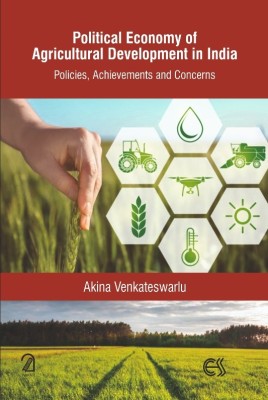The political economy of agricultural development in India(English, Hardcover, Venkateswarlu Akina)
Quick Overview
Product Price Comparison
The book covers agricultural development from the colonial to the present period. It examines how ruling class political ideology determined the agricultural policies from colonial rule. It considers both quantitative and qualitative aspects in all periods: colonial period to pre-green revolution phase, post-green revolution phase (early and late stages) and post-globalisation phase after 1991. India has achieved ability to maintain food security, through enough foodgrain buffer stocks to meet the enormous public distribution system. But, with IndiaŌĆÖs entry into WTO in 1994, euphoria has been created among all types of farmers to adopt commercial crops like cotton cost-intensive inputs. Even foodgrain crops are grown through use of costly irrigation and chemicalised inputs. But they lacked remunerative prices, and so farmers began to commit suicides, which crossed 3.5 lakh. Government of India attributed this agrarian crisis to the technology fatigue and gave scope for second green revolution (GR-II). GR-I was achieved by public sector enterprise, whereas the GR-II as gene revolution is a result of private sector enterprise/MNCs. There is fear that opening up of the sector may lead to hand over the family farms to big agri-multinationals. GOIŌĆÖs proposal to double farmersŌĆÖ income by 2022 is feasible only when the problems, being faced by small, marginal and tenant farmers are addressed in agricultural marketing, credit and extension services. Now, it is time to think to go for suitable forms of cooperative/ collective agriculture, as 85 percent of total cultivators are the small and marginal farmers. This is a study of political economy of agrarian development. It covers the colonial period, land reforms, green revolution, and liberalized and globalized economy. Akina VenkateswarluŌĆÖs book gives us a comprehensive picture about how domestic and international politics have mattered in determining the transformation of agriculture. - Dr. Shinichi Shigetomi, Professor, Meiji Gakuin University, Japan


